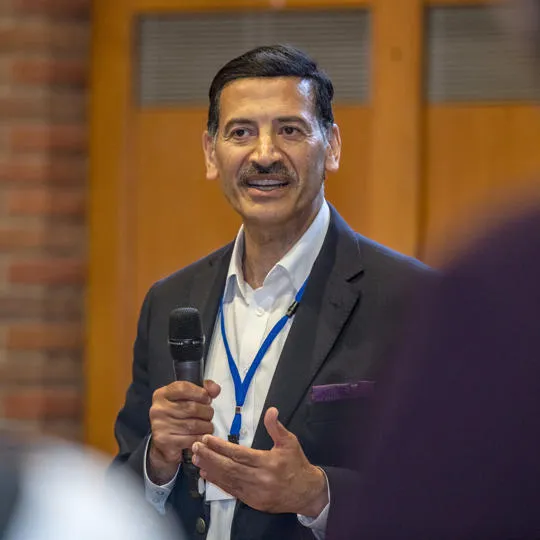The team aims to develop new hardware to reduce the cost in developing complex models by a thousand times.

A team from the Department of Engineering has been awarded a multimillion-pound grant from the Advancing Research & Invention Agency (ARIA) to explore how brain-inspired computing can train artificial intelligence (AI) cheaper and more efficiently.
Established by parliament and sponsored by the Department for Science, Innovation and Technology, ARIA is UK's new research funding agency and aims to fund teams of scientists and engineers to research the boundaries of science and technology.
AI models are increasingly being integrated into daily life, but these are typically large and complex, and to function accurately must be trained on substantial amounts of data. This process is very costly uses huge amounts of energy.
Large technology companies are buying up large quantities of expensive GPU cards - used to process the data necessary to train large models such as ChatGPT in data centres, with some even having built-in nuclear reactors to supply the energy necessary to power them.
If we were able to draw inspiration from these mechanisms of biological learning and memory formation for use in man-made systems, we could drastically slash the energy needed to develop AI models."
Professor Bipin Rajendran
In addition to the environmental concern, the power usage of data centres for AI model training is very costly preventing all but a small group of global technology companies from training large models.
To reduce the environmental impact and cost of AI, the ARIA grant will fund Professors Bipin Rajendran, Osvaldo Simeone, and Dr Kai Xu to create new hardware and software solutions to make the training and fine-tuning process more efficient.
The team will develop novel algorithms inspired by the way the brain encodes and transmits data. This approach is more efficient than current methods that use 'backpropagation' - a back-and-forth process that uses large amounts of energy to fine-tune the connection strengths between the artificial neurons that make up AI models in order to make them more accurate.
ARIA funding is aimed at truly scientific breakthroughs that lead to major societal and economic benefits, we are delighted Professor Bipin Rajendran and his team have secured funding from such a prestigious institution through their innovative computing ideas and transformative research outcomes."
Professor Bashir Al-Hashimi, Vice-Principle (Research & Innovation)
Bipin Rajendran, a Professor of Intelligent Computing Systems and one of the leads of the project explains:
"Nature is far more efficient when it comes to conserving energy. While we do not fully understand how our brains learn, we do know that synapses transmit information only in one direction and the signalling activity of the neurons play a key role in how the connections are strengthened or weakened in the brain.
"If we were able to draw inspiration from these mechanisms of biological learning and memory formation for use in man-made systems, we could drastically slash the energy needed to develop AI models."
Professor Osvaldo Simeone, Professor of Information Engineering and project co-lead, said of the potential impact of the work: "In recent years, we have discovered the power of fine-tuning pre-trained large models. However, current solutions are hardly sustainable, and new information processing paradigms appear to be required to make progress. This project will contribute to this important line of research by taking inspiration from the operation of biological brains."
The team will also design more energy efficient hardware platforms employing "in-memory computing" circuits that blur the traditional lines between data storage and processing.
This will further help reduce the energy and time required by today's computers where the hardware units that store data and process it are separated.
Commenting on the grant, Professor Bashir Al-Hashimi, Vice-President (Research & Innovation) said, "ARIA funding is aimed at truly scientific breakthroughs that lead to major societal and economic benefits, we are delighted Professor Bipin Rajendran and his team have secured funding from such a prestigious institution through their innovative computing ideas and transformative research outcomes.










